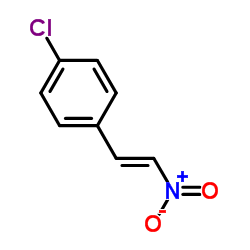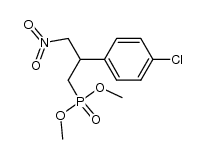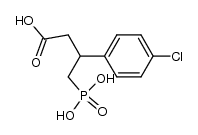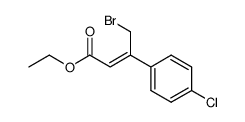3-氨基-2-(4-氯苯基)丙基膦酸
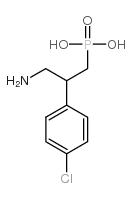
3-氨基-2-(4-氯苯基)丙基膦酸结构式

|
常用名 | 3-氨基-2-(4-氯苯基)丙基膦酸 | 英文名 | PHACLOFEN |
|---|---|---|---|---|
| CAS号 | 114012-12-3 | 分子量 | 249.63100 | |
| 密度 | 1.432 g/cm3 | 沸点 | 467.1ºC at 760 mmHg | |
| 分子式 | C9H13ClNO3P | 熔点 | N/A | |
| MSDS | 中文版 美版 | 闪点 | 236.3ºC | |
| 符号 |

GHS07 |
信号词 | Warning |
3-氨基-2-(4-氯苯基)丙基膦酸用途法氯芬是一种选择性GABAB受体拮抗剂。法克罗芬是一种外周和中枢巴氯芬拮抗剂。Phaclofen可能是一种潜在的化合物,用于确定GABA和(-)-巴氯芬相互作用的中枢和外周荷包牡丹碱不敏感受体的生理意义[1][2]。 |
| 中文名 | 法克罗芬 |
|---|---|
| 英文名 | Phaclofen,(RS)-3-Amino-2-(4-chlorophenyl)propylphosphonicacid |
| 中文别名 | 3-氨基-2-(4-氯苯基)丙基膦酸 |
| 英文别名 | 更多 |
| 描述 | 法氯芬是一种选择性GABAB受体拮抗剂。法克罗芬是一种外周和中枢巴氯芬拮抗剂。Phaclofen可能是一种潜在的化合物,用于确定GABA和(-)-巴氯芬相互作用的中枢和外周荷包牡丹碱不敏感受体的生理意义[1][2]。 |
|---|---|
| 相关类别 | |
| 靶点 |
GABAB receptor[1] |
| 体内研究 | 法氯芬(100 nmol;鞘内注射)拮抗巴氯芬的抑制作用。Phaclofen(100 nmol)对脊髓反射没有刺激或抑制作用[3]。 |
| 参考文献 |
| 密度 | 1.432 g/cm3 |
|---|---|
| 沸点 | 467.1ºC at 760 mmHg |
| 分子式 | C9H13ClNO3P |
| 分子量 | 249.63100 |
| 闪点 | 236.3ºC |
| 精确质量 | 249.03200 |
| PSA | 93.36000 |
| LogP | 2.26030 |
| InChIKey | VSGNGLJPOGUDON-UHFFFAOYSA-N |
| SMILES | NCC(CP(=O)(O)O)c1ccc(Cl)cc1 |
| 外观性状 | 白色固体 |
| 储存条件 | 密封储存,储存于阴凉、干燥的库房。 |
| 稳定性 | 常温常压下稳定,避免与强氧化剂接触。 |
| 分子结构 | 1、摩尔折射率:58.81 2、摩尔体积(cm3/mol):174.2 3、等张比容(90.2K):492.7 4、表面张力(dyne/cm):63.9 5、介电常数:无可用的 6、极化率(10-24cm3):23.31 7、单一同位素质量:249.032157 Da 8、标称质量:249 Da 9、平均质量:249.6312 Da |
| 计算化学 | 1.疏水参数计算参考值(XlogP):-2.4 2.氢键供体数量:3 3.氢键受体数量:4 4.可旋转化学键数量:4 5.互变异构体数量:无 6.拓扑分子极性表面积83.6 7.重原子数量:15 8.表面电荷:0 9.复杂度:238 10.同位素原子数量:0 11.确定原子立构中心数量:0 12.不确定原子立构中心数量:1 13.确定化学键立构中心数量:0 14.不确定化学键立构中心数量:0 15.共价键单元数量:1 |
| 更多 | 1. 性状:白色固体 2. 密度(g/mL,25℃):未确定 3. 相对蒸汽密度(g/mL,空气=1):未确定 4. 熔点(ºC):未确定 5. 沸点(ºC,常压):未确定 6. 沸点(ºC,10mmHg):未确定 7. 折射率(n20/D):未确定 8. 闪点(ºC):未确定 9. 比旋光度(º):未确定 10. 自燃点或引燃温度(ºC):未确定 11. 蒸气压(mmHg,20ºC):未确定 12. 饱和蒸气压(kPa,25ºC):未确定 13. 燃烧热(KJ/mol):未确定 14. 临界温度(ºC):未确定 15. 临界压力(KPa):未确定 16. 油水(辛醇/水)分配系数的对数值:未确定 17. 爆炸上限(%,V/V):未确定 18. 爆炸下限(%,V/V):未确定 19. 溶解性:未确定 |
| 符号 |

GHS07 |
|---|---|
| 信号词 | Warning |
| 危害声明 | H315-H319-H335 |
| 警示性声明 | P261-P305 + P351 + P338 |
| 个人防护装备 | dust mask type N95 (US);Eyeshields;Gloves |
| 危害码 (欧洲) | Xi: Irritant; |
| 风险声明 (欧洲) | R36/37/38 |
| 安全声明 (欧洲) | 26-36 |
| 危险品运输编码 | NONH for all modes of transport |
|
~% 
3-氨基-2-(4-氯苯基)丙基膦酸 114012-12-3 |
| 文献:Hall Synthesis, 1989 , # 6 p. 442 - 443 |
|
~% 
3-氨基-2-(4-氯苯基)丙基膦酸 114012-12-3 |
| 文献:Hall Synthesis, 1989 , # 6 p. 442 - 443 |
|
~% 
3-氨基-2-(4-氯苯基)丙基膦酸 114012-12-3 |
| 文献:Chiefari, John; Galanopoulos, Speros; Janowski, Wit K.; Kerr, David I. B.; Prager, Rolf H. Australian Journal of Chemistry, 1987 , vol. 40, # 9 p. 1511 - 1518 |
|
~% 
3-氨基-2-(4-氯苯基)丙基膦酸 114012-12-3 |
| 文献:Chiefari, John; Galanopoulos, Speros; Janowski, Wit K.; Kerr, David I. B.; Prager, Rolf H. Australian Journal of Chemistry, 1987 , vol. 40, # 9 p. 1511 - 1518 |
|
~% 
3-氨基-2-(4-氯苯基)丙基膦酸 114012-12-3 |
| 文献:Chiefari, John; Galanopoulos, Speros; Janowski, Wit K.; Kerr, David I. B.; Prager, Rolf H. Australian Journal of Chemistry, 1987 , vol. 40, # 9 p. 1511 - 1518 |
| 3-氨基-2-(4-氯苯基)丙基膦酸上游产品 3 | |
|---|---|
| 3-氨基-2-(4-氯苯基)丙基膦酸下游产品 0 | |
|
PKC-mediated GABAergic enhancement of dopaminergic responses: implication for short-term potentiation at a dual-transmitter synapse.
J. Neurophysiol. 112(1) , 22-9, (2014) Transmitter-mediated homosynaptic potentiation is generally implemented by the same transmitter that mediates the excitatory postsynaptic potentials (EPSPs), e.g., glutamate. When a presynaptic neuron... |
|
|
Transcriptome analysis of the key role of GAT2 gene in the hyper-accumulation of copper in the oyster Crassostrea angulata.
Sci. Rep. 5 , 17751, (2015) One paradigm of oysters as the hyper-accumulators of many toxic metals is the inter-individual variation of metals, but the molecular mechanisms remain very elusive. A comprehensive analysis of the tr... |
|
|
The antinociceptive effect of stimulating the retrosplenial cortex in the rat tail-flick test but not in the formalin test involves the rostral anterior cingulate cortex.
Pharmacol. Biochem. Behav. 131 , 112-8, (2015) The stimulation of the retrosplenial cortex (RSC) is antinociceptive in the rat tail-flick and formalin tests. The rat RSC is caudal to and send projections to the ipsilateral anterior cingulate corte... |
| 3-Amino-2-(4-chlorophenyl)propanephosphonic acid |
| MFCD00069328 |

